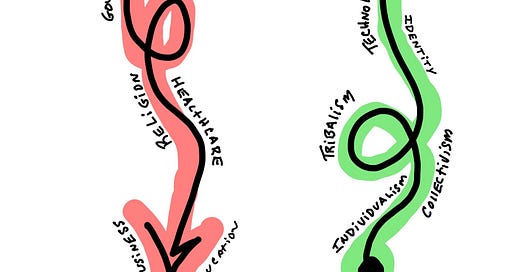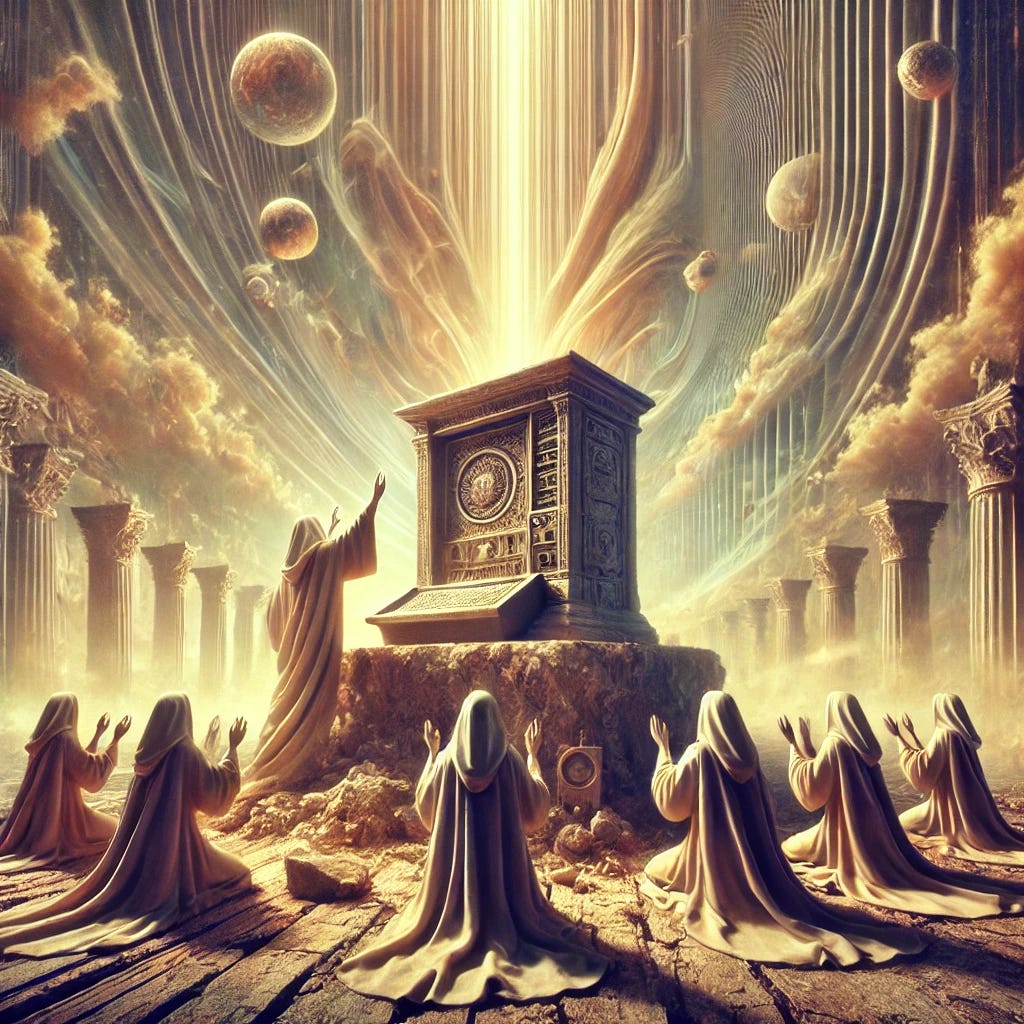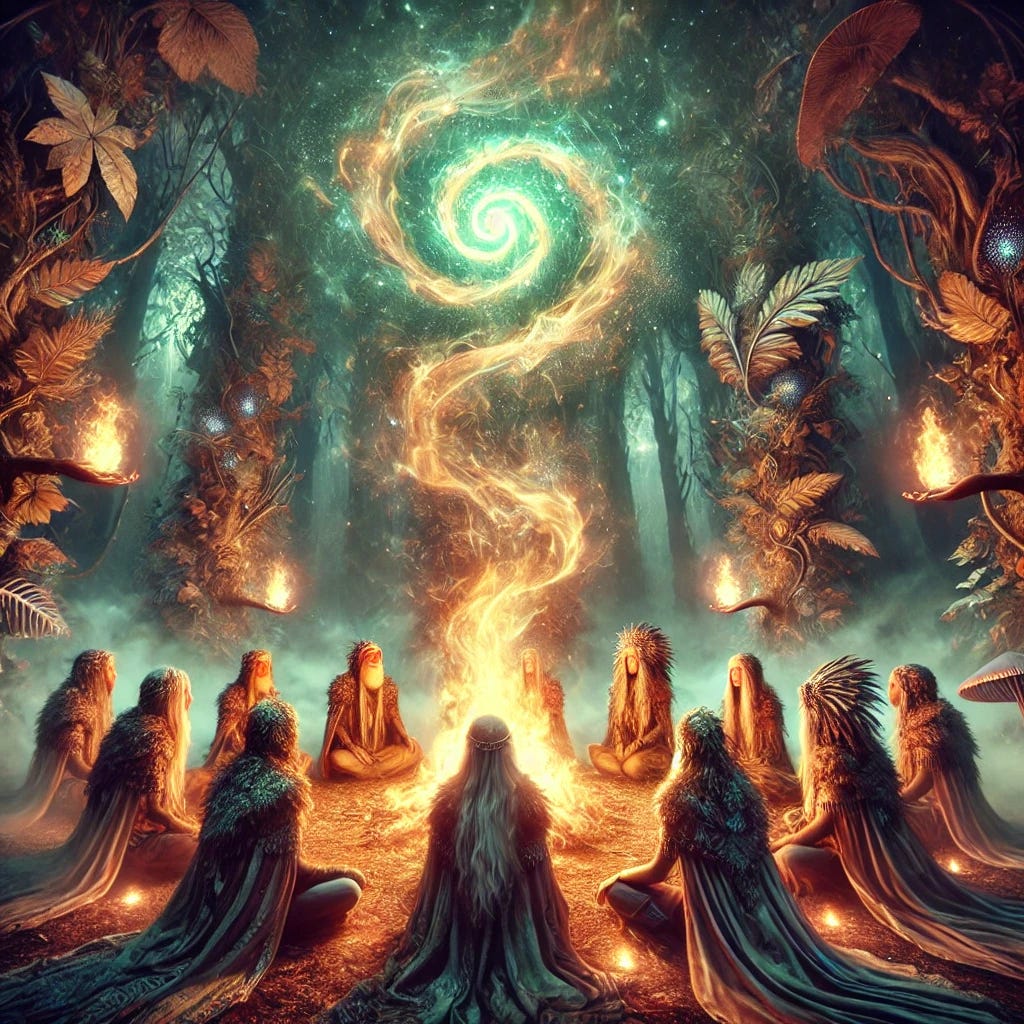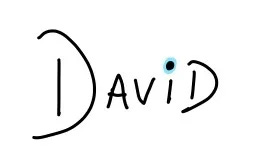We’ve been steadily losing faith in our institutions for some time and must ask ourselves what a post-institutional world will look like moving forward. While some faith in our institutions can be restored, it’s just as likely that our relationships with traditional institutions become irreversibly redefined. Unexplained drone flights and the latest narrowly avoided government shutdown are merely the most current examples in a long history of events, instances, and institutional trends that fracture, if not shatter, our faith in the longstanding relationships we have historically had with traditional institutions such as government. Let’s take a high-level look at the state of our institutions with some recent reference points that are pushing the public past the point of no return when it comes to trust in our institutions:
Media:
Mainstream media has been under duress and at risk of being out of step with much of the public over the past decade. However, the recent election cycle viscerally underscored two things: the first is that the narrative of much mainstream media was out of sync with a large segment of the populace. The second, perhaps more consequential, is that the legacy media institution had lost significant influence and relevance compared to the emerging media personalities and channels, from Podcasters to social media, to generally what would be considered uncredentialed non-journalists. If I had to bet on TikTok's future, I’d wager that it gets reconstituted under U.S.-based governance, placing it on the path to one of the most influential modern media platforms.
Business:
Look no further to GenZ’s largely ambivalent attitudes toward the business world as a key indicator of the state of trust regarding how businesses operate. During the pandemic, many employers quickly praised their employees for their efforts working remotely while keeping things humming. Now, many employers are locked in a contentious relationship with employees who demand more flexibility while many employers yearn for a return to a pre-pandemic world of office work. Layoffs seem more frequent and casual, and AI and efficiency lurk around every corner. Gone are the days of working for one or two companies during your career; pensions are almost extinct, replaced by 401ks (also steadily declining), and loyalty (and trust) between employer and employee increasingly feels fragile.
Healthcare
America seems to be waking up to the fact that we’re being failed on multiple institutional levels regarding our health. The recent assassination of United Healthcare’s CEO is only one part of the picture, ripping the scab off the wounds of millions of Americans whose lives were upended because they got sick and had to work through insurance health insurance companies. However, it’s not only health insurance. Our stress-heavy lifestyles, combined with food that makes us sick slowly, are made even more complex by the pharmaceutical industry, which offers solutions but also creates additional challenges and side effects. All of this makes it feel like the odds are stacked against us if we want to become or remain healthy. When we become sick, hospitals are incentivized to minimize the time we spend in our beds, crucial time—which we need to recover and get well.
Education
We’re experiencing a failure in education in two specific areas: Higher education is failing us in terms of cost and value, and it is operating as one of the few industries that has increased exponentially in cost. In contrast and related to the business institution, it is becoming more common for a student who has amassed significant debt to graduate with a degree that doesn’t necessarily translate into that first entry-level job. Lastly, it took October 7 to expose troubling ideological belief systems in some of our most prestigious universities, with antisemitism becoming one of today’s top issues in higher ed. In parallel, School systems in some of our biggest districts, such as Chicago, are producing historic lows in academic performance contrasted with landmark highs in budgets and funding.
Religion
Our connection with traditional religious establishments has steadily declined, with church attendance reaching historic lows. Gallup’s recent findings on church attendance suggest that the decline is not limited to one specific religious affiliation; instead, it is a decline across all major religions:
Two decades ago, an average of 42% of U.S. adults attended religious services every week or nearly every week. A decade ago, the figure fell to 38%, and it is currently at 30%. This decline is largely driven by the increase in the percentage of Americans with no religious affiliation -- 9% in 2000-2003 versus 21% in 2021-2023 -- almost all of whom do not attend services regularly.
Still, most religious groups have also seen a decline in regular service attendance over the past two decades. Much of organized religion has done no favors to this broader institution, ranging from a history of pedophilia being prevalent in the Catholic Church to exploitation of finances via evangelical figures. Regardless of self-infliction, we’re losing faith in faith—or at least the traditional version of it.
Government
COVID-19 likely presents one of the key tipping points where faith in our government became even more compromised than it was before. With the benefit of hindsight, we can objectively evaluate the overcorrection, incompetence, created by governmental policies unlawfully taken advantage of, ranging from falsely applying for forgivable loans to increased criminal activity nationwide. More recently, FEMA has come under scrutiny regarding federal assistance during natural disasters, not only in places like North Carolina but also in wildfire-ravaged Maui in the Hawaiian islands. The recent re-election of Trump further signals a distrust in government as the core of his entire platform for running in the first place is a promise to bring reform and disruption to D.C.
From Institutions To Substitutions
My former employer, Edelman, has been tracking this steady decline in institutional trust for decades, often documenting shifts (for example, the tech sector was once most trusted and then became least trusted). Still, the Edelman Trust barometer usually would conclude that it is up to business leaders and the private sector to help restore the trust eroded in institutions such as government, media, and NGOs. I think we’re well past this point, having outlined just a couple of the issues within the world of work and business.
We are already moving into a post-institutional world, which will challenge conventional norms for decades as we shift from traditional institutions to modern substitutions for them. Here are a few areas where these shifts are taking place:
Identity Through Issues
In politics, pundits often refer to non-policy related issues as “cultural,” but while not policy-oriented, they are also issue-based and usually result in policy/law. With the decline in government and religious institutions comes a rise in our personally held convictions, issue by issue. Whether it’s climate, rights for marginalized communities or views on abortion—our identities are increasingly becoming defined by the cultural issues that we feel are important to us. Immigration has recently become one of these defining issues, likely influencing policies and how we view immigration moving forward. A good indicator of the importance of cultural issues is how frequently they are discussed in podcasts, TikToks, live streams, and many emerging new media channels.
Increasingly, we are what we believe about cultural issues debated at the societal and governance levels. In many ways, our beliefs about issues have become substitutes for traditional institutional pillars such as religion.
Technology Idolatry
The irony is that while big tech companies have lost a good deal of trust from the public for issues ranging from social media addiction to monopolization to having too much power and influence, we are all beholden to technology. Every hour spent consuming algorithmically curated content delivered through mechanisms made possible via technology or any number of activities we engage in front of a screen can do so at the expense of time where we could be shutting off stimulation in reflection and/or meditation. Generally, I am an optimist regarding technology, but it is naive to ignore the fact that with technology comes great responsibility. And tech’s most recent breakthrough innovation with Generative AI may bring us closer to what we feel makes the act of creation itself possible. If we aren’t careful, technology has a way of becoming so wonderful and magical that we bow to it as our ancestors bowed to mythical gods and mystical deities in the ancient world.
Tribalistic Tendencies
Somewhat related to our loss of faith in government is our degradation in viewing ourselves as part of a much bigger national identity. Still, we seek to feel part of and connected to something bigger than ourselves where others share the same values we do. This is where tribalism comes in, splintering specific value sets into more niche, specialized, and less tied to national identity. This isn’t entirely new; our country has always consisted of subsets of different cultures, groups, organizations, and communities, but these subsets increasingly operate more autonomously and act as a substitution of national identity. Our relationship with media, particularly, has become tribal, with a fragmented and increasingly digital media ecosystem serving news and opinions aligned with our tribal affiliation of choice (see Bluesky). When we feel that larger institutions no longer serve or represent us, we naturally retreat to alternative organizations where we feel the kinship and support of people like ourselves.
Collectivist Conformity
Complimentary to finding and primarily existing within tribal bubbles is when we begin to take action in groups and collectives. The key distinction here is that this action is not taken under the identity of a government or national banner (think military or other national, state, or local government functions) but collective action at the civilian level. January 6th was a recent example and turned violent—but so were many demonstrations held during the days and months of George Floyd. The broader point here is that when trust and faith in government institutions decline, there is a correlation and perhaps some causation behind groups forming collectives, both online and offline—and collectively taking action in some shape or form.
Individualism Rebellion
Inevitably, broken trust in institutions leads to skepticism of institutional pillars such as government. Still, for many, it also enhances a desire to be self-sufficient, self-reliant, and self-secure at the individual level. For the ultra-wealthy, this self-sufficient individualism has manifested in massive land purchases in places like Hawaii and New Zealand, where people like Mark Zuckerberg built doomsday-resistant bunkers. However, this “rely on individual self” mentality isn’t reserved only for the mega-rich. It is an increasingly popular movement where people identify as “preppers,” shorthand for “preparation” in the context of a society-compromising event such as mass civil unrest. As of June 2024, TruePrepper estimates around 23 million preppers in the United States.
This is a significant increase from a decade ago. Preppers have historically been linked to the right or far right on the political spectrum, but this, too, is evolving as the movement has become more diverse, with more minorities and people who identify as left-of-center politically joining. In short, the movement was somewhat enhanced by government failures during the pandemic and is founded on a sense that, ultimately, we are responsible for our safety at the individual level and cannot rely on the government alone to save us. Aside from issues of societal collapse, “rugged individualism” as a general life philosophy indexes high on self-reliance and low on dependency on institutional pillars, particularly government.
Institutional distrust and decline inevitably leave a vacuum in which substitutions fill in for what our institutions used to provide. All of the above is merely a snapshot and an observation of yours truly, so it’s highly unscientific. But there are data points, as evidenced by research such as the Edelman Trust Barometer, combined with our own lived anecdotal experiences if we’re willing to stop, look, and think about them. Don’t expect our institutions to crumble dramatically, but we can expect our post-institutional future to look different from what we’ve known in the past.
Visually yours,










